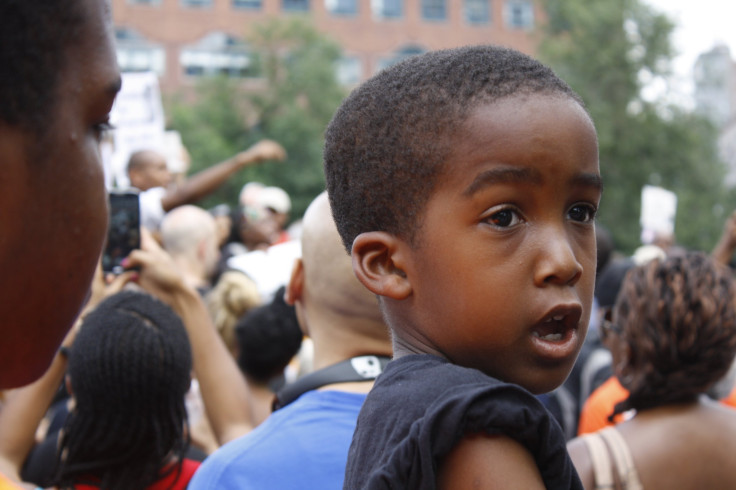Trayvon Martin-George Zimmerman: A Different Kind Of Protest Movement

I have long disliked protest marches and public demonstrations of any kind in the United States. For the past 20-plus years in New York City, I have witnessed (but never participated in) any number of public expressions of mass discontent, stretching all way back to the first Gulf War, the Rodney King beating, the assault by the NYPD on Abner Louima, the Republican National Convention, the second Gulf War, all the way up to last year's Occupy Wall Street disturbances.
Generally speaking, given my East Indian origin, I view the United States as a country that God has blessed with so much wealth, natural resources, democracy and comfort that Americans have no legitimate reasons to “protest.”
Yes, I know millions of people here struggle here with unemployment and poverty, but having witnessed appalling destitution on an epic scale in India, the U.S. is comparatively a heaven on earth. Few Americans actually starve to death, and there are enough jobs (perhaps menial low-paying positions) for nearly everyone. Plus, the social welfare system here is so well established (Social Security, unemployment insurance, disability, etc.) that scarce few fall through the cracks of society into complete deprivation.
Consequently, I have always perceived protest marches in the late 20th century-early 21st century America with extreme skepticism. I ask myself: What are people so upset about? What are they really saying? Who do they represent? Is this all about exhibitionism? Getting one's face on TV and newspapers?
I recall a young woman I worked with who attended an anti-war rally after Saddam Hussein's armies invaded Kuwait. It turned out she had no clear idea who Saddam was, nor where Iraq or Kuwait were even located (and this was an otherwise intelligent college-educated woman!).
Apparently, she attended the rally because she hated President George H.W. Bush (although why was unclear) and she felt that military intervention was simply “wrong.” This harkened back to stories I had heard about anti-war rallies during the Vietnam War period whereby many demonstrators had no clue where Vietnam was!
So, based on my background and my perception of late 20th century American society, I have not had much respect for acts of public dissent. They seemed rather pointless and self-indulgent.
That is, until the outrage following the acquittal of George Zimmerman on murder charges related to the killing of an unarmed black teenager named Trayvon Martin.
Simply out of curiosity, I watched the protests related to this case in Union Square in downtown Manhattan – and what I saw stunned and impressed me. Unlike prior similar displays of public outrage, this particularly one seemed genuine and drawn from deepest wells of emotion.
For black people – particularly for black parents with sons – the tragedy of Trayvon Martin strikes at the very heart of their worst insecurities, fear and anxieties. That is, an innocent adolescent boy can be shot to death simply for being in the wrong place at the wrong time when confronted by the wrong person.
I saw black mothers clutching their children with tears in their eyes and despair in their hearts – the murder of Trayvon Martin harkened back to the long, grim history of lynching in the Deep South, something that likely lingers in the back of every black person’s mind, even in the “liberal” urban Northeast.
This was not about some distant conflict in a foreign land (Iraq, Afghanistan, Vietnam), nor did it have anything to do with the abstract concepts of capitalism and labor (OWS). It had everything to do with mothers' and fathers’ most visceral fears – that their children could be executed in public simply for being black.
As such, surprising even myself, I was moved by the participants at this Union Square demonstration.
But the problem with many such protests is that they are often hijacked by parties and entities that have their own agenda.
For example, at the Union Square assembly, there were a number of people (very few of whom were black) carrying placards promoting something called the “Workers World Party” (which, I guess is some lunatic fringe Marxist splinter group). They held up signs that not only demanded justice for Trayvon (and the arrest of Zimmerman), but also tried to link this drama to the apparent “evils” of capitalism and even asserted that the events of Sanford, Fla., were somehow connected to gay rights and the Israeli-Palestinian conflict. (To the best of my knowledge, neither Trayvon nor Zimmerman have anything remotely to do with either homosexuality or the Middle East.)
Groups like this tend to use the “injustice of the month” in order to advance their own mysterious agenda or simply as a vehicle for publicity. And that in itself is a form of exploitation, since at the core of this issue are the concerns of black mothers who fear for the safety of their children.
Still, even with the true expressions of fear, outrage, and grief, I am not certain that these protests will lead to any substantive policy changes by the courts or the government. Even if the Justice Department files a civil suit against Zimmerman, he will likely never see the inside of a prison cell and Trayvon will still be dead.
Eventually, this, like many other media spectacles before it, will become a distant memory, and life will go on. And nothing will be done about the pain and fear those mothers suffer.
© Copyright IBTimes 2024. All rights reserved.











